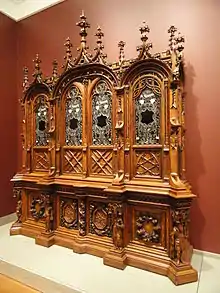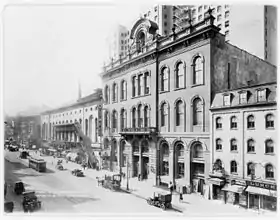Ernst Plassmann
Ernst Plassmann (14 June 1823 – 28 November 1877; alternate spelling, Plassman) was a German-American sculptor and carver.
.jpg.webp)
Biography
Born in Sondern, near Wuppertal, North Rhine-Westphalia, Plassmann began to study art under Munstermann, then continued his studies in Aachen,[1] Cologne, and finally in Paris, where he spent about four years in the studio of Michel Liénard. He moved to New York City in 1853, and in 1854 established "Plassmann's School of Art", which he ran the rest of his life.[2] In 1858 he founded the "Verein fur Kunst und Wissenschaft" (Association for Art and Science).[3] In New York he became known for his statue of Benjamin Franklin (1870–1) in Printing House Square,[4] depicted as a printer by including an issue of the Pennsylvania Gazette in his left hand.[1][5] Plassmann spent months researching Franklin busts, portraits, and costumes, and he "labored conscientiously for several months" on the "colossal" clay statue, which was inaugurated on 17 January 1872.[4][6]

His figures of Franklin and Guttenberg are located on the New Yorker Staats-Zeitung building (c.1873). The heroic statue of Chief Tammany, a legendary Delaware Indian chief, is part of the façade of Tammany Hall on 14th Street (1868/9),[7] while the 1869 8.5 feet (2.6 m) bronze statue of Cornelius Vanderbilt, the Commodore Vanderbilt, is located at the south façade of Midtown Manhattan's Grand Central Terminal.[8] A Plassmann sculpture stands in the freight depot of the New York Central Railroad (1870), aside from various metal works, including medals. In 1875, he published Modern Gothic Ornaments with 83 plates. He began publishing Designs for Furniture in 1877, and had completed three parts by the time of his death (in New York City).
Selected works
- (1875) A collection of modern Gothic ornaments for architects, sculptors, modelers, designers, painters, &c., &c.
- (1877) Designs for furnitures and development,
_terminal_at_St._Jones_Park%252C_from_Robert_N._Dennis_collection_of_stereoscopic_views.jpg.webp) Cornelius Vanderbilt pediment (1868), Hudson River Railway Freight Depot. Demolished.
Cornelius Vanderbilt pediment (1868), Hudson River Railway Freight Depot. Demolished. Commodore Vanderbilt (1868), relocated to Grand Central Terminal, 1929.
Commodore Vanderbilt (1868), relocated to Grand Central Terminal, 1929. Staats-Zeitung Building (c. 1873). Demolished for construction of the approach to the Brooklyn Bridge.
Staats-Zeitung Building (c. 1873). Demolished for construction of the approach to the Brooklyn Bridge. Tammany Hall, West 14th Street, NYC
Tammany Hall, West 14th Street, NYC
References
- Pohlsander, Hans A. (2010). German Monuments in the Americas: Bonds Across the Atlantic. Peter Lang. p. 105. ISBN 978-3-0343-0138-1.
- Wilson, James Grant; Fiske, John (1898). Appletons' Cyclopaedia of American Biography: Pickering-Sumter (Public domain ed.). D. Appleton. p. 38.
- "Woodlawn Conservancy" (accessed 28 August 2014)
- Black, Mary (24 July 2013). Old New York in Early Photographs. Dover Publications. p. 47. ISBN 978-0-486-31743-4.
- Lightfoot, Frederick S. (1981). Nineteenth-century New York in Rare Photographic Views. Dover Publications. p. 22. ISBN 978-0-486-24137-1.
- Record of the Proceedings and Ceremonies Pertaining to the Erection of the Franklin Statue in Printing-house Square. F. Hart & Company. 1872. p. 98.
- Bondarin, Arley (1975). All around the town: a walking guide to outdoor sculpture in New York City. Scribner. p. 31. ISBN 978-0-684-14256-2.
- Durante, Dianne L. (2007). Outdoor Monuments of Manhattan: A Historical Guide. NYU Press. p. 132. ISBN 978-0-8147-1986-2.
Further reading
- McCormick, Heather Jane (1998), Ernst Plassmann, 1822–1877: A New York Carver, Sculptor, Designer and Teacher
- A bust of Plassmann was sculpted by US artist Caspar Buberl (1834–1899).
| Wikimedia Commons has media related to Ernst Plassmann. |